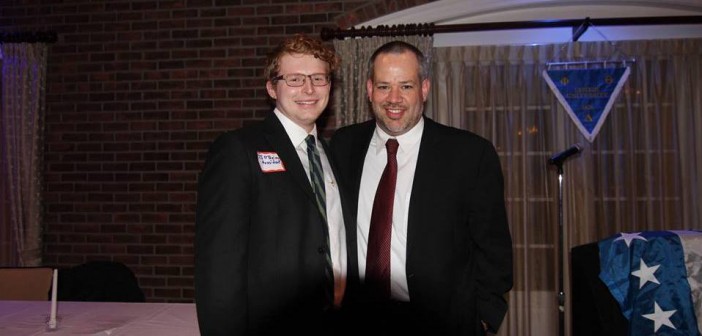The coming of fall means turning over a new leaf for the presidents of some Greek chapters on campus.
Several organizations have completed their election processes for presidencies, as well as many other positions. However, not all chapters employ the same selection process, nor do all chapters start the process in the same semester.
For Olivia Hodina, ’15, this past Tuesday was her last official day as president of Kappa Delta sorority. She passed her title to Kelsey Briel, ’16. For KD, the selection process is a lengthy one. KD uses a slating committee made up of the president of the sorority, an alumna and one member of each academic class as elected by the chapter.
“The slating committee sits down and picks what they think the counsel should be,” Hodina said. “That’s called ‘the slate.’ After that, the chapter has a whole week to see the slate and read everyone’s applications.”
The chapter then votes for the president first, followed by eight other positions.
Hodina also explained that in order for a sister to be considered as president, she has to have served on the counsel for a full year. Briel served as the vice president of membership before being elected president this month.
“Since it’s a longer transition process, I’ve been shadowing Olivia for the past two weeks,” Briel said. “But we’ve worked closely in counsel before. I personally feel I’m very prepared.”
Hodina said a lot of Greek houses vote in the spring, making their executive councils based on calendar year.
“I think it makes more sense to have terms be a whole academic year, though,” she added. “It’s so hard to transition with recruitment, accreditation and new member programs.”
Phi Delta Theta, or Phi Delt, is one such fraternity that follows a calendar year of presidency. The organization starts its voting process at the beginning of spring semester. JJ O’Brien, ’16, the current president of Phi Delt, describes its voting process as very democratic. O’Brien said that nominations are made first, and the brothers then vote on the top three nominees for each of their 10 executive positions. A final vote is then taken.
For Alpha Gamma Delta sorority, the process of choosing a president and executive board begins at the start of second semester, as well. President Ellen Weich, ’16, came into this semester with several months of presidency already under her belt.
“All of the old presidents are leaving, and I get to see the new ones coming in,” Weich said.
Alpha Gam’s process for selecting its president and executive board officers differs, as well, in comparison to KD.
“It’s strictly voting,” Weich said. “We don’t have a slate. We just have an actual ballot, and it’s whoever gets the majority vote. The old president counts the votes.”
Alpha Gam also features 20 positions and seven executive board positions that sisters can hold. For the sorority, a sister does not have to be a part of the executive board before becoming president.
“I was the first president in quite a few years that didn’t have an executive position,” Wiech said. “I was activities coordinator before.”
Pi Kappa Alpha, more commonly known as Pike, employs a modified version of the slating committee, said current president Conor Press, ‘15.
“We have elections in November,” he said. “Our president actually takes office in March, when the new member education ends. We allow for a healthy amount of transition time.”
Press said that Pike just implemented its modified system this year.
“The slating committee members are actually chosen by each respective pledge class,” Press said. “The slating committee interviews all the candidates and makes recommendations. Each of those are voted on by the chapter. It’s halfway between pure democracy and pure slate.” Pike’s elections for its new president and executive board will take place Nov. 23.
Although the inner workings and processes may differ from house to house, the qualities that a president should possess are consistent.
“You’re the face of the organization,” O’Brien said. “You need to know how to be articulate and express the interests of the fraternity.
“Being able to delegate is also important,” he continued. “Leadership is less about how you lead and more about how well the people you lead do. One leader alone can never do as well as a leader with a team.”
“I think it needs to be someone who is good with managing a lot of people, who goes between different friend groups and pledge classes,” Weich said. “It helps a lot to have a relationship with a wide range of people. Humor is important, too. Sometimes you need to be stern, but have to have that lighter side, as well.”
Hodina also agreed that prospective presidents have to be very good at working with all different types of people.
“You definitely have to be responsible, not only for yourself,” she said. “You kind of take ownership for everyone in the chapter. You always have to be on your game. You can’t mess up. Your ability to plan is important, and to communicate.”
Press said his fraternity looks for someone who will represent the organization in every capacity.
“We want someone who’ll get the job done at the end of the day and relate to the chapter, but get all administrative work done and have a good relationship with the national council and alumni,” he said.
Another aspect of presidency that remains consistent across chapters is the time commitment and amount of responsibility that the position brings.
“You’re always on the job, and you’re always answering emails,” Hodina said. “Being president is constant. I call nationals every week and work with them a lot. I’m very involved with the Panhellenic Council, and I go to those meetings every week. I work with the Office of Fraternity and Sorority Affairs here and meet with our Greek advisor biweekly.”
Weich noted the big time commitment of the position and said that the beginning proves challenging, particularly in the first few weeks, when new presidents receive around 30 to 40 emails a day.
Despite the time commitment and other challenges that presidency brings, the elected officers’ passion for their jobs and love for their chapters remain strong.
“I am going to do anything and everything for these girls,” Weich said. “The snippets of times with pure sisterhood and smiling and laughing in the common room remind me of why I took the role. I genuinely love and care about each one of these girls.”






Comment policy
Comments posted to The Brown and White website are reviewed by a moderator before being approved. Incendiary speech or harassing language, including comments targeted at individuals, may be deemed unacceptable and not published. Spam and other soliciting will also be declined.
The Brown and White also reserves the right to not publish entirely anonymous comments.